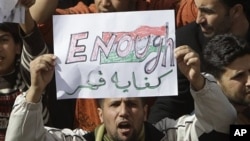Fighters loyal to Libyan leader Moammar Gadhafi are reinforcing their grip on the capital, Tripoli, as a growing popular uprising spreads across the eastern half of the country.
Anti-government forces there have consolidated control over key cities, and have vowed to "liberate" Tripoli.
Protest organizers in the capital, which is Gadhafi's stronghold, called for new rallies Thursday and Friday, raising the potential for a new bloody confrontation there.
Empty streets
Tripoli residents said the streets were largely deserted Wednesday, with people afraid to leave their homes. Armed militiamen and pro-Gadhafi loyalists - a mix of Libyans and African mercenaries - are reportedly roaming through Tripoli and fortifying the city's outer defenses. Security agents are said to be searching for people considered disloyal to the regime.
Anti-government forces claimed to have taken control of Misurata, Libya's third-largest city about 200 kilometers from Tripoli, marking the westernmost advance of the opposition movement. People fleeing across the border into Tunisia reported heavy fighting in the town of Sabratha, 80 kilometers west of the capital.
Protests spreading
Meanwhile, protesters and mutinous army units continue to consolidate their hold on nearly the entire eastern half of Libya's 1,600 kilometer-long coastline, setting up rudimentary governments and manning checkpoints along the main roads.
Video clips: Libya Protest (Some video clips courtesy of YouTube)
In the eastern city of Benghazi, cradle of the revolt against Gadhafi, rebels and supporters thronged the streets waving red, green and black monarchy-era flags and handing out food to passing cars. Benghazi residents also formed units to collect weapons and protect property.
In the eastern city of Baida, police stations, intelligence buildings and other installations representing Gadhafi's rule stood in ruins as people celebrated in the street. A VOA correspondent at the Egyptian border with Libya says "well-armed men" celebrating their control of the region were chanting and waving the country's pre-Gadhafi-era flag.
Military defections
In a further sign of Gadhafi's faltering hold, a Libyan newspaper reported Wednesday that two air force pilots parachuted out of their warplane and let it crash into the eastern Libyan desert rather than follow orders to bomb Benghazi. Earlier, two Libyan bombers had diverted to Malta rather than bomb civilians.
Gadhafi vowed to stay in power and called on his supporters to fight back against opposition protesters during a televised address Tuesday -- his first since the uprising began last week. He described anti-government demonstrators as "gangs" and "terrorists" on hallucinogenic drugs and threatened death to anyone who took up arms against Libya.
The overall death toll has been impossible to determine. Human rights groups say they have confirmed about 300 deaths, though witnesses suggest the number is far larger. On Wednesday, Italian Foreign Minister Franco Frattini said more than 1,000 people have likely been killed in Libya's week-long uprising.
Slide show of latest situation in Libya
Loyalist defections
In a significant setback to Gadhafi, a close associate, Interior Minister Abdel Fattah Younis, announced his defection and support for the uprising. Numerous other Libyan officials, including the justice minister, diplomats and military officers, have also turned against the Libyan leader in recent days.
On Wednesday, former justice minister Mustafa Abdel-Jalil was quoted as telling Swedish tabloid Expressen that Gadhafi personally ordered the 1988 bombing of Pan Am Flight 103 over Lockerbie, Scotland that killed 270 people. Gadhafi has accepted Libya's responsibility for the bombing and paid compensation to the victims' families. But he hasn't admitted to personally giving the order for the attack.
The disintegration of Libya's government has added to the relative power of Libya's many tribes, each claiming the loyalty of thousands of members. Colonel Gadhafi's tribe, the Gadhafa, dominates parts of the armed forces. The Warfalla - cut out of the power structure since members allegedly attempted to overturn the regime in 1993 - have backed the eastern rebellion.
Gadhafi took power in a 1969 coup.




